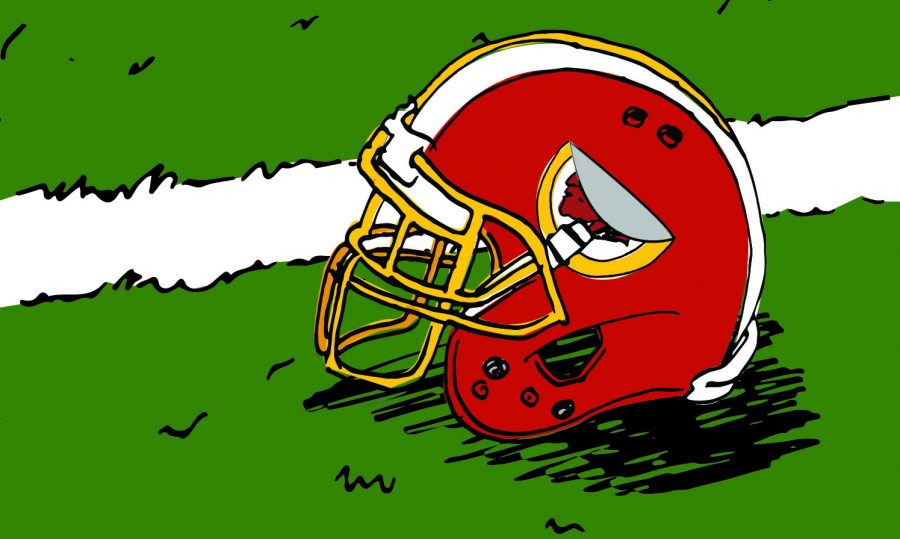Redskins facing all-out blitz over ‘racist’ name
Redskins helmet
September 2, 2014
The Washington Redskins’ name has been the subject of much debate in recent months, and everyone seems to have an opinion about it.
Prominent sports figures such as CBS color commentator and former New York Giants quarterback Phil Simms and NBC analyst and former Indianapolis Colts Head Coach Tony Dungy have said they will not use the full name and will simply refer to the team as “Washington.”
The Washington Post has echoed those sentiments, releasing a statement Aug. 22 announcing that it will no longer use the term “Redskins” in its editorials. ESPN has also weighed in on the issue by formally issuing a press release stating that its employees can choose whether or not to use the name at their own discretion, a first in the network’s 35-year history.
NFL Commissioner and Redskins supporter Roger Goodell said at a pre- Super Bowl press conference in January that the name is meant to honor Native Americans.
Several Native American organizations disagree, calling the name racist and offensive, including the American Indian Association of Illinois. Dr. Dorene Wiese, president of the AIAI, said she believes that the Redskins’ attempt to honor Native Americans is misguided.
“How can they say that if we feel disgraced by it as American Indian people?” Wiese said. “How can they say they are honoring us when we are sitting in front of them saying no, you are not? That’s just a lack of reality.”
Phil Konstantin, journalist and author of the book “Native American History for Dummies” said he does not see the problem as black and white.
“Most people have mascots [and] they want something that’s fierce, warlike and powerful,” Konstantin said. “So I could see how someone could mean something like that as a form of respect [toward Native Americans].”
Another argument from Redskins supporters such as former Chicago Bears Head Coach Mike Ditka is that the team name should not be changed because it is 80 years old.
“It’s been an issue since the white contact in America,” Wiese said. “As American Indian people, we have never before had media power and the power of the Internet and social media to complain about it.”
The Washington Redskins Senior Vice President of communications Tony Wyllie declined to comment. The team has remained firm in its refusal to change the name, but Wilfredo Cruz, associate professor of sociology at Columbia, said he believes it is only a matter of time until the team is forced to give in.
“You just have to keep politically pressuring them,” Cruz said. “People in power don’t change overnight.”
On June 18, the U.S. Patent and Trademark Office revoked the Redskins trademark. The team faced a similar challengew in 1999, but the U.S. PTO ruled in favor of the Redskins. The 1999 victory has made Redskins’ owner Daniel Snyder appear quite confident in statements he has given of winning an appeal in the recent ruling. The fact that the Redskins are the NFL’s third most valuable franchise, as reported Aug. 20 by Forbes.com, might enable them to keep the name.
Stan West, a Culture, Race and Media professor at Columbia who is also a member of the Cherokee Nation, said the name’s meaning may evoke different reactions this time around because people are more aware.
“The population is more educated,” West said. “The younger people are more open-minded and would rather not offend an innocent [person].”
West said the Redskins name needs to change, regardless of any trademark value it may have, out of respect for the culture it offends.
“The times have changed, and so should corporations who profit off of mascoting people of color,” West said.
As controversial as the Redskins name has been, they are not the only team with a name or mascot that has been deemed offensive. The Kansas City Chiefs, Atlanta Braves and Cleveland Indians have all come under fire in the past, and NCAA teams, such as Stanford and the University of Illinois have changed their mascots.
Stanford University changed its mascot from an Indian to a tree after Native Americans students spoke out against it, and the student senate voted the logo out in 1972. The University of Illinois retired their “Chief Illiniwek” mascot in 2007 after the NCAA cracked down on all logos and names considered offensive to Native Americans.
However, if the Redskins name were to be successfully overturned, it would be the first time a professional team has forcefully had its name changed. Wiese said she thinks this may be just the beginning for name revisions at the professional level.
“The National American Indian Education Association, which is the largest [such] organization in the country, has come out against all [offensive] logos and sports teams,” Wiese said. “Because we know that it does harm our children, and it does harm children in America.”








